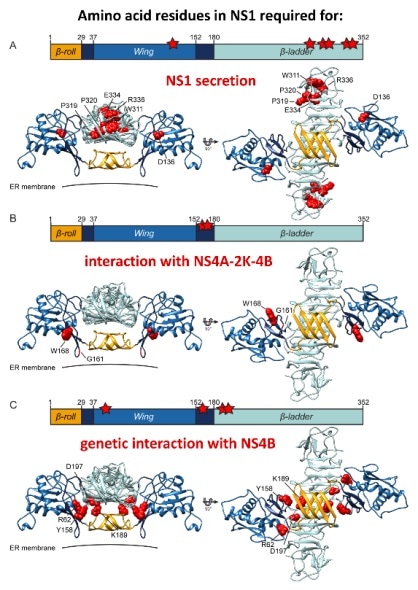
Study reveals how dengue virus replicates in infected cells
The nonstructural protein 1 (NS1) of the dengue virus interacts with another viral protein called NS4A-2K-4B to enable viral replication, according to a study published May 9 in the open-access journal PLOS Pathogens by Ralf Bartenschlager of the University of Heidelberg, and colleagues. As noted by the authors, the genetic map presented in the study offers a starting point for the design of antiviral agents targeting NS1, with the goal of suppressing viral replication as well as severe disease manifestations.

Overview of amino acid residues in NS1 required for NS1 secretion, interaction with the NS4A-2K-4B precursor and RNA replication. Credit: Płaszczyca A, et al. (2019)
Dengue virus is one of the most prevalent mosquito-transmitted human pathogens. Despite the serious socio-economic impact of dengue-associated diseases, the only licensed vaccine has limited efficacy and an antiviral therapy is not available. NS1 is secreted from infected cells, counteracts antiviral immune responses, and contributes to the severe clinical manifestations of dengue. In addition, NS1 is essential for the viral replication cycle, but the underlying molecular mechanism is unknown. To address this gap in knowledge, Bartenschlager and colleagues used a combination of genetic, biochemical and imaging approaches to determine the role of NS1 in the viral replication cycle.
The researchers identified a cluster of amino acid residues in NS1 that is important for efficient secretion of this protein. Moreover, they identified a novel interaction between NS1 and the precursor of a viral protein called NS4A-2K-4B; this interaction is required for viral RNA replication. The researchers also demonstrated that NS1 is required for the generation of the membranous dengue virus replication organelle in infected cells. This function does not require RNA replication and is independent from NS1’s interaction with NS4A-2K-4B. Taken together, the results provide new insights into the role of NS1 in viral RNA replication and establish a genetic map of residues in NS1 required for the diverse functions of this protein.
The authors add:
Source:





















.png)












No hay comentarios:
Publicar un comentario